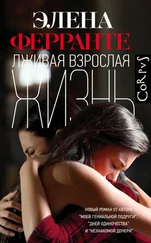“Why?”
“Because I was even more of an idiot than I am now.”
I would have liked her to tell me about it, but she said there was nothing to tell. Rosario was a nobody, but because of the father he had—the ugly Naples, Giannì, the terrible Italy that no one can change, least of all Roberto with the fine words he speaks and writes—he thought he was hot shit. He was so stupid he thought that since they had sometimes been together he had the right to remind her of it on every occasion. Her eyes became wet with tears:
“I have to get out of Pascone, Giannì, I have to get out of Naples. Vittoria wants to keep me here, she likes being at war all the time. And Roberto deep down sees it the way she does, he told you he has a debt. But what debt? I want to get married and live in Milan in a nice house of my own, in peace.”
I looked at her in bewilderment.
“Even if for him it’s important to come back here?”
She shook her head hard, began to cry. We stopped in Piazza Dante. I said:
“Why are you acting like this?”
She dried her eyes with her fingertips, murmured:
“Would you go with me to see Roberto?”
I answered immediately:
“Yes.”
12.
Margherita summoned me Sunday morning, but I didn’t go directly to her house, I went first to Vittoria’s. I was sure she was behind the decision to ask me to take Giuliana to see Roberto and I imagined that she would cancel the assignment if I didn’t show myself affectionately subordinate. During that entire time, I had barely glimpsed her when I went to see Giuliana, and she had been ambivalent as usual. I’d become convinced over time that when she recognized herself in me she was overwhelmed with affection, while if she perceived something of my father she suspected that I might do to her and the people she was attached to what her brother had done to her in the past. Besides, I was the same. I found her extraordinary when I imagined myself becoming a combative adult, and repulsive when I recognized in her traits of my father’s. That morning something suddenly occurred to me that seemed intolerable and yet funny: neither Vittoria nor my father nor I could cut out our common roots, and so, depending on the situation, it was always ourselves we ended up loving or hating.
It turned out to be a lucky day, Vittoria seemed happy to see me. I let her hug and kiss me with her usual clingy intensity. I love you so much, she said, and we left quickly for Margherita’s. On the way, she revealed to me what I already knew but pretended not to, that the very rare times when Giuliana had been allowed to see Roberto in Milan, Tonino had gone with her. But now he had left for Venice, abandoning the family—Vittoria’s eyes filled with tears in a mixture of suffering and contempt—and since Corrado absolutely couldn’t be trusted, they had thought of me.
“I’ll do it happily,” I said.
“But you have to do it right.”
I decided to duel a little, when she was in a good mood she liked it. I asked:
“In what sense?”
“Giannì, Margherita is timid but not me, and so I will tell you straight: you must assure me that Giuliana will always be with you, night and day. You understand what that means?”
“Yes.”
“Good for you. Men—keep it in mind—want one thing only. But Giuliana mustn’t give him that thing before she gets married, otherwise he won’t marry her.”
“I don’t think Roberto is that type of man.”
“They’re all that type of man.”
“I’m not sure.”
“If I say all, Giannì, it’s all.”
“Even Enzo?”
“Enzo more than others.”
“Why did you give him that thing?”
Vittoria looked at me with pleased surprise. She burst out laughing, she clasped me around the shoulders hard, gave me a kiss on the cheek.
“You’re like me, Giannì, and even worse, that’s why I like you. I gave it to him because he was already married, he had three children, and if I didn’t give it to him I would have to give him up. But I couldn’t, because I loved him too much.”
I pretended to be satisfied with that answer, even if I would have liked to show her that she was a twisted person, that the thing that is most important to males you don’t grant on the basis of opportunistic evaluations, that Giuliana was a grownup and could do what she liked, that she and Margherita, in short, had no right to keep a young woman of twenty under surveillance. But I was silent because my only desire was to go to Milan and see Roberto, see with my own eyes where and how he lived. And then I knew that I shouldn’t take things too far with Vittoria, while I’d made her laugh now, a small affront would be enough for her to throw me out. So I chose the path of consent and we reached Margherita’s house.
There I assured Giuliana’s mother that I would diligently watch over the fiancés, and Vittoria, while I spoke in a good Italian to give myself authority, whispered often to her goddaughter: get it, you and Giannina have to be together at all times, the main thing is you have to sleep together, and Giuliana nodded distractedly, and the only one who annoyed me with his teasing looks was Corrado. He offered several times to take me to the bus, and when all the pacts with Vittoria were ratified—we were to return Sunday night, absolutely, Roberto would pay for the train tickets—I left and he came with me. On the street and while we were waiting at the bus stop, all he did was mock me, making offensive remarks as if he were joking. Mostly he kept asking me explicitly to do again the things I had done in the past.
“A blow job,” he said to me in dialect, “and then that’s all: there’s an old abandoned building near here.”
“No, you make me sick.”
“If I find out you did it with Rosario, I’ll tell Vittoria.”
“I don’t give a fuck,” I answered, in a dialect that made him laugh hard, it was so badly pronounced.
I felt like laughing, too. I didn’t want to fight even with Corrado, I was too glad to be going away. On the way home I concentrated on what lie I would have to tell my mother to explain a trip to Milan. But soon I convinced myself that I didn’t owe her even the effort of lying, and at dinner I said to her, in the tone of one who considers the thing irrefutable, that Giuliana, Vittoria’s goddaughter, was going to visit her fiancé in Milan and I had promised to go with her.
“This weekend?”
“Yes.”
“But Saturday is your birthday, I’ve organized a party, your father is coming, Angela and Ida are coming.”
For a few seconds my chest felt empty. How attached I’d been to my birthday as a child, and yet this time it had gone right out of my mind. I had the impression that I had wronged myself even more than my mother. I couldn’t assign myself value, I was becoming a background figure, a shadow beside Giuliana, the ugly chaperone of the princess who goes to the prince. For that role was I willing to give up a long, pleasant family tradition, candles to blow out, surprising presents? Yes, I admitted, and proposed to Nella:
“Let’s celebrate when I get back.”
“You’re upsetting me.”
“Mamma, don’t make a big deal out of nothing.”
“Your father will be hurt, too.”
“You’ll see, he’ll be glad: Giuliana’s fiancé is someone really smart, Papa respects him.”
She made a grimace of displeasure, as if he were responsible for my inadequate emotions.
“Are you going to be promoted?”
“Mamma, that’s my thing, don’t interfere.”
She muttered:
“We don’t count for you at all anymore.”
I said that wasn’t true and yet I thought: Roberto counts more.
13.
On Friday night began one of the most senseless enterprises of my adolescence.
Читать дальше

![Элена Ферранте - История о пропавшем ребенке [litres]](/books/32091/elena-ferrante-istoriya-o-propavshem-rebenke-litres-thumb.webp)
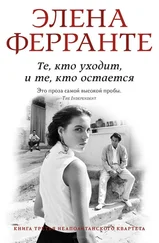
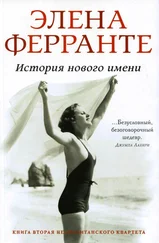
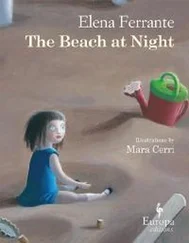
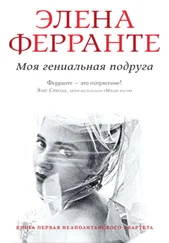
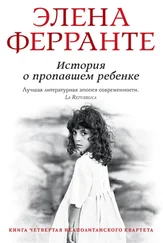
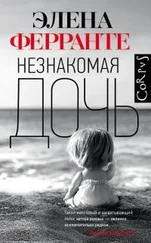
![Элена Ферранте - Дни одиночества [litres]](/books/404671/elena-ferrante-dni-odinochestva-litres-thumb.webp)

